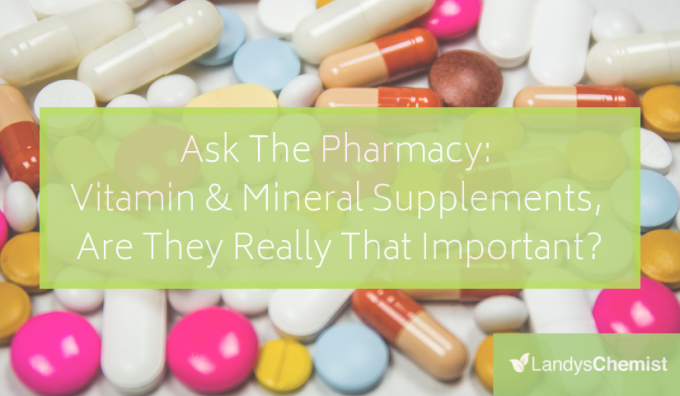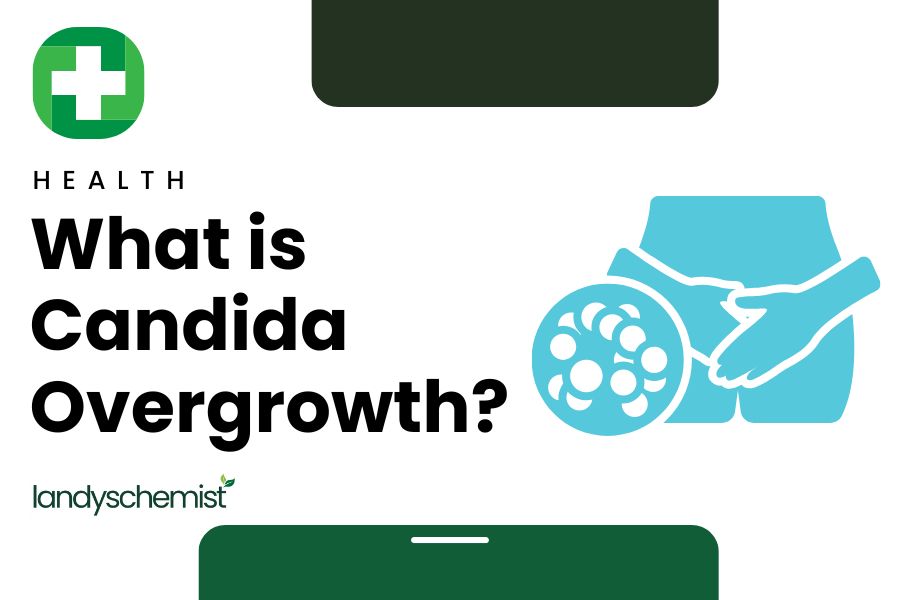
Ask The Pharmacy: Vitamin & Mineral Supplements, Are They Really That Important?
This is the first video in our new video series, Ask The Pharmacy. In this premiere video, we talk about the benefits, and risks, of vitamin and mineral supplements.
A transcript is available under the video.
(Start Video Transcript)
What are vitamins and minerals?
“Vitamins and minerals are nutrients that are important to help our body function properly. Too much or too little of these vitamins can cause mild ancillary conditions whether it be dry skin or brittle bones.
And actually it is worth noting that particularly over the last 20 years there have been a lot of changes in terms of people’s daily diets that’s causing us to get different proportions of vitamins and minerals compared to what we have naturally and generally been used to over a very very long period.
So it is important that we make sure we get the right kind of vitamins in the right balance which is why we provide lots of information in our vitamin and mineral glossary to help people drill down and focus on what they need or might be missing nutrient wise.”
What has changed in our diet (nutrient wise)?
“The most remarkable one is fish oil. In the past it was generally recommended that you got twice as much omega 3 as omega 6 and 9. Omega 3 comes from fish sources whereas 6 and 9 comes from plant based sources.
Because of the change in people’s diets people tend to be getting 3 times the amount of 6 and 9 as omega 3 these days.
These subtle changes are leading to all sorts of things. Fish oil can affect anyone, whether it be mothers who are potentially going through post-natal depression which is way more common if you’re not taking enough omega 3 because, to put it in the worst way possible, your baby is leeching all your DHA out of you - whether it be in your tummy or whether you are breastfeeding so post-natal depression is way more likely if you’re not getting enough omega 3.
But also things like joint pain – much more likely when you’re not getting enough omega 3 in your diet.”
Where can I get vitamins and minerals from?
“You can get the vast majority of vitamins and minerals from a balanced diet and also by living a healthy lifestyle. By that I mean spending time outdoors but the simple truth is in some cases it simply isn’t possible, in others your dietary restrictions might not make this possible. For example if you are a vegetarian you will struggle to get a healthy amount of essential fatty acids.
So it is possible but really with modern life it is really essential that you supplement on a day to day basis.”
How do we know if supplements work?
“There is a remarkable amount of evidence and a great body of research showing particularly the trouble that can be caused by vitamin and mineral imbalances.
It often happens during certain more strenuous periods of life. The most obvious natural example of that is something like pregnancy where your baby requires so much it can really leave you quite drained and imbalanced and in many cases doctors and the NHS will actively recommend you do take supplements to try to rectify those imbalances.”
What conditions can you take supplements for?
“In truth there is a huge variety of conditions. There is a great body of evidence showing that certain imbalances can lead to certain problems. A great example of that which is perhaps lesser known but increasingly common in the western world is fungal nail infections and fungal infections are far more likely to occur when your body is short on zinc.”
What About Deficiencies?
“Zinc is part of the natural immunity building system in the body. You are far more likely to come down with things like flu when your immune system is weaker which might occur because, for example, of a lack of zinc or possibly also vitamin C.
The other most famous deficiency is vitamin D. In a country like England it is never sunny and it often rains and as a result we are all vitamin D deficient because we don’t spend enough time exposed to the sun but what is really remarkable is when you look at sunny countries like the middle east, places like Dubai, Saudi Arabia etc. rates of vitamin D deficiency are even higher there because it is so sunny that everybody spends their time in air conditioned buildings and, rather than walking the streets, they take cars everywhere.
So wherever you live, whatever your environment, if you are spending too long indoors, if you are wearing sun tan lotion - which prevents ageing and protects your body from cancer - you are inhibiting your body’s ability to absorb vitamin D.
In so many cases people complain of fatigue and in so many cases it is because of a vitamin D deficiency.”
Should you take supplements daily?
“I think so yes, absolutely. I think lots of people essentially wait until something is going wrong to then start investigating. That inevitably starts with a trip to the GP and a blood test. But actually that is quite a laborious process and in many cases it is better to effectively get ahead of the curve.
And in many cases it is incredibly predictable – at the moment we are in summer but when we approach winter it is far more common that you will be vitamin D deficient and that your immune system might need more protection. That is because when your body is colder your immune system is naturally weakened which is why you are more likely to get sick in the winter than the summer.
These are all little things that we can effectively prepare for in our day to day life to help us all feel better.”
Should we be thinking about age and nutritional needs?
“Yes, absolutely. So what we find it that through the ageing process our bodies have different requirements. A great example of that is that as we get older our bodies start to produce less of a chemical called hyaluronic acid. Hyaluronic acid sits in the skin and essentially helps our body to hold water, or our skin to hold water.
That’s why as we age we have less hyaluronic acid in our skin and the result is that our skin starts to sag - it looks less firm and supple. That’s why older people are much more likely to complain of dry skin - because of their hyaluronic acid deficiency
We can look at the same thing for children. Children up to pretty much the age of 16 are going through an incredible amount of brain development and the odds are that in 90% of cases that you are simply not supporting the child well enough to allow for that brain development through fish oils.
So these are two small but incredibly common examples of how we can really help ourselves at different ages to supplement in certain ways.”
How long do supplements take to work?
“It’s actually a tricky question to answer. And unfortunately the vague truth is that it does depend.
There are certain supplements out there which a lot of people with, for example, arthritis and other kinds of joint pain take that promise results within seven days. However in many cases, for example with a vitamin D deficiency, you can be talking four – six weeks before you start to see a real improvement or change.
So it is something that requires a little bit of commitment and time and to some extent you have to commit to the process to really see the benefits.”
Can we measure if supplements work? Is it down to how we feel?
“In some cases it can come down to feeling. The positive thing is that the feedback we get from the supplements we often sell is incredibly positive. The reason people start using supplements and don’t stop is because they feel a difference - they notice there is a significant impact.
We have quite a lot of customers who will take something and then go away on a three or four week trip and forget it and the moment they get back they are on the phone to us saying “oh! I never thought it made a difference until I stopped taking it” so actually it is remarkable how these things really do work.
And in many cases actually you can measure – for example if you were vitamin D deficient you can measure the impact via a blood test where you can see that you have moved up the scale and you are no longer deficient – so in some cases it is measurable and in other cases, as you say, based on a feeling.”
Are there risks of taking (too many) supplements?
“Yes, there are risks. There are undoubtedly risks as there are with just about anything in life. Too much can actually end up being a bad thing.
So we talked a great deal about vitamin D deficiency today. The trouble is that vitamin D is actually water soluble and the result is that there is a chance that if you take too much for too long (and in truth it is an incredibly high dose required for quite a sustained period) it can be risky, so it is important to speak to a nutritionist or gain at least some understanding before you start down the road.
I wouldn’t necessarily recommend self-diagnosis. For most people it is important to seek a credible source to get the information that you need.
The other thing that I would add is that vitamins and minerals, whilst they are essential for the functioning of the body and are things that we have acquired naturally through food for thousands of years, they are also not medicine. They are not intended to cure diseases.
So, whilst vitamins and minerals can absolutely be used to help in a preventative way and also to help improve your daily being I wouldn’t at any point say to you that product x can cure disease y and it is important to remember that.
(End Video Transcript)
Coming Soon...
Over the coming weeks we’ll be going into these and other conditions in more depth to answer your specific needs and the variety of factors that should be considered when taking vitamins and minerals whether it’s by age or by gender or a variety of factors.
If you do have any queries, please do message us @landys_chemist or #AskLandys on Twitter, and we will add it to our events page.
About Mitesh:
Mitesh works at Landys Chemist as a nutritionist. His focus is on ensuring people’s wellbeing and to offer solutions where people are finding an imbalance in their life.
Disclaimer
The products offered are not intended to diagnose, treat, cure, or prevent any illness or disease, or to replace the advice of a medical professional. Results are not guaranteed and may vary from individual to individual.




